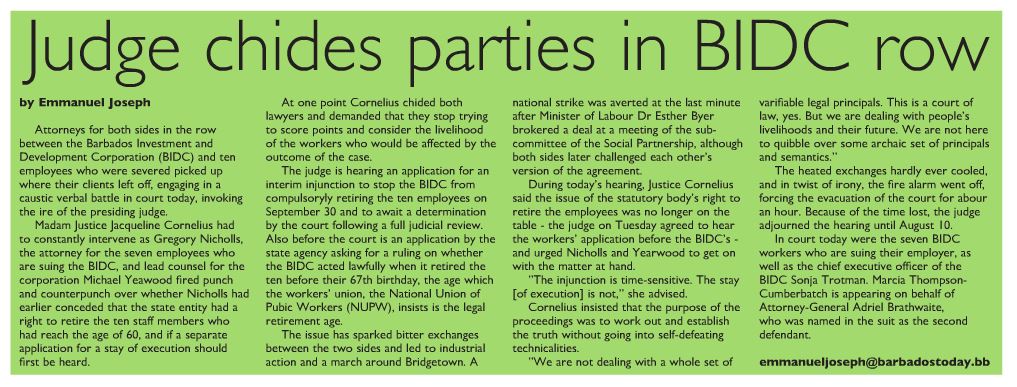
BU shares the Jeff Cumberbatch Barbados Advocate column – Senior Lecturer in law at the University of the West Indies since 1983, a Columnist with the Barbados Advocate since 2000 and BU commenter – see full bio.
The dispute: source and aftermath
7/26/2015
As most of my readers may have surmised, I am fascinated by the seemingly intractable industrial relations dispute between the Barbados Industrial Development Corporation [BIDC] and the National Union of Public Workers [NUPW]. At least these were the original parties, although it should be clear to all by now that the current governing administration has unsurprisingly intervened into the dispute as a party for the Corporation, inevitably bringing with it a heightening of the sorry political partisanship that bedevils most public conversation in Barbados.
Thus, rather than discussion being focussed on the morality and/or legality of the issue of the terminations of employment of the workers for the stated reason, and the appropriateness of the NUPW’s response, many opinions are apparently based on whether the contributor supports the governing party or not. We ought to hang our heads in shame. This, in my humble view, is not the way a self-proclaimed “educated” society should respond to social issues. I do concede that the horse may already be long out of the stable on this point however.
In consequence perhaps, the matter is swiftly degenerating into farce, with a shoddy undocumented and hence useless settlement of the dispute that might or might not have been; the amazing spectacle of the chairperson of the conciliation proceedings publicly chastening one of the parties; the overnight generation of scores of experts on employment relations law not shy to offer their views; plainly contradictory media reports concerning the intentions of the workers to return to BIDC even if the letters of termination are withdrawn.
There has been, in addition, the sight of the Prime Minister, despite the current configuration of the Lower House, hinting at the use of parliamentary constitutional powers of legislation to restore “peace, order and good government” to the nation, and recent news of a court action for injunctive judicial review having been filed by a number of the workers.
A recent statement by the Honourable Minister of Finance, Mr Chris Sinckler, published in another section of the press, might have revealed the root cause of the dispute. According to the Minister, “If the organisation is not bringing in enough money to be able to supplement what Government gives it in terms of a transfer to be able to carry out their function, then they have to make some changes so that they will be able to continue to be, at least, at a minimum (sic), viable…”
From this, one may gather that at the basis of the terminations was the need to cut the costs of employment, the Board perhaps having considered that the other option, that of increasing income, was a non-starter in the existing economic conditions. This basis fits snugly into the statutory definition of redundancy- “where the requirements of that business for employees to carry out work of a particular kind, or for employees to carry out work of a particular kind in the place where the employee was so employed, have ceased or diminished or are expected to cease or diminish…”
For some reason, at which I may surmise only, it was decided that this was not the more or most viable option of restructuring in the circumstances. Perhaps it was a recognition of the costs of such an exercise; perhaps it was born out of a reluctance to engage the unions; most likely it was the discovery of the existence of section 8(1) of the Statutory Boards Pensions Act, Cap 384 that permits the Board to “require an officer to retire at any time after he attains the age of 60 years…”
Here was the veritable “deus ex machina” for the BIDC. Apparently, there would be no need to engage in nettlesome and dilatory social dialogue with the union as to the aptest mode of selection for termination; no need to incur the costs of redundancy; no need to justify on any other ground the objectively alarming spectacle of putting relatively young people out to pasture in contradistinction to the prevailing local norm of compulsory retirement at 67 years. The provision in the statute was clear.
As I have already written in this space, this view failed to take into account subsequent legislation affecting the termination of employment of those in statutory corporations, and I need not comment further on this particular point. However, a number of other legal issues have now arisen as sequelae of this dispute that provide a fertile source for detached commentary.
Among these are, not in any order of significance, the notion of payment of wages for those workers of the Sanitation Service Authority who are alleged to have withheld their labour in solidarity with their comrades in the NUPW; the allied question of the legality of secondary or sympathy industrial action; the distinction, if any, between a forced retirement and a dismissal; the fairest method of selection for redundancy; the extent of parliamentary power under section 48 of the Constitution; the issue of the designation of the sanitation services as an essential service; and whether the “go-slow” may be categorised as identical to strike action.
Payment of wages
The law is clear that a worker is entitled to be paid his or her wages so long as he or she is ready and willing to work only. This is to be taken as stated, so that even if the employer is unable to provide work for the worker, the ready and willing worker is entitled to be paid his or her wages, unless he or she is dismissed, laid off, put on short time or the employer is able to establish that the contract has otherwise come to a end or has been suspended.
While this rule may be altered by agreement of the parties, as has occurred previously, there still remains the vexed question of who bears the burden of establishing that the worker was indeed ready and willing to work. On the accepted principle that he who affirms must prove, it would seem that in the present situation where the Sanitation Service Authority has declared an intention “not to pay one red cent”, that the workers will have to show that they presented themselves for work on the disputed occasion and were forced, through no fault of their own, from undertaking the assigned tasks or that there was a valid excuse for them not to present themselves for work at those times.
The sympathy or secondary strike
This has been defined as the phenomenon “where workers come out in support of another strike”. There is no existing local legislation governing this matter, so that a workers’ organisation that is either the bargaining agent for, or allied to the bargaining agent for a body of workers for whose functioning is critical to the welfare of the society is all the stronger for its ability to call these workers out or have them called out in solidarity with their comrades in another field. Although some jurisdictions have enacted legislation that proscribes this form of industrial action, the international labour law that Barbados has ratified is less rigid, pointing out that a general prohibition of these strikes may lead to abuse and that workers should be able to take such action providing that the initial strike that they are supporting is itself lawful.
To be continued…






The blogmaster invites you to join the discussion.